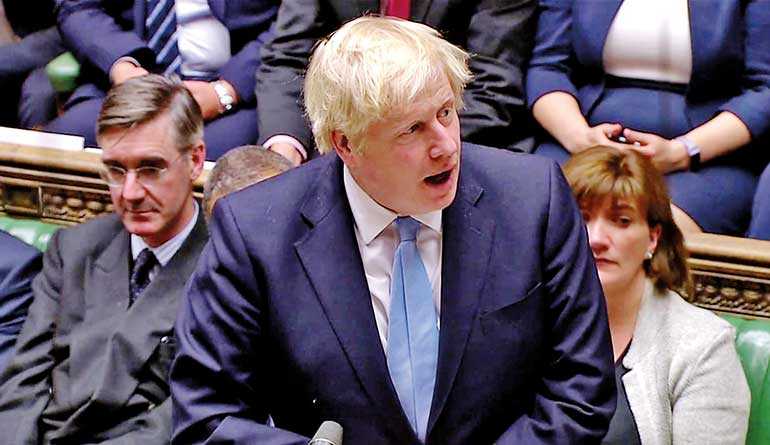Monday Feb 23, 2026
Monday Feb 23, 2026
Thursday, 12 September 2019 00:00 - - {{hitsCtrl.values.hits}}

Britain’s Prime Minister Boris Johnson gestures as he meets Ireland’s Prime Minister (Taoiseach) Leo Varadkar (not pictured) in Dublin, Ireland – Reuters
LONDON (Reuters): Scotland’s highest court of appeal ruled on Wednesday that Prime Minister Boris Johnson’s decision to suspend parliament was unlawful, deepening the uncertainty over Britain’s departure from the European Union.
Johnson’s government said it would appeal the court ruling on the suspension, which has been criticised by opposition lawmakers as undemocratic, suggesting the prime minister would stick to his Brexit plan and keep parliament shut.
With only seven weeks until Britain is due to quit the EU, the future of Brexit is as unclear as ever, with the possible outcomes ranging from the world’s fifth largest economy leaving without a deal to the 2016 referendum being overturned.
“We are calling for parliament to be recalled immediately,” Scottish National Party lawmaker Joanna Cherry told Sky News after the verdict by Scotland’s Inner Court of Session.
A government spokesman expressed disappointment at the decision.
“(We) will appeal to the UK Supreme Court. The UK government needs to bring forward a strong domestic legislative agenda. Proroguing parliament is the legal and necessary way of delivering this.”
Johnson, who was a figurehead for the Vote Leave campaign in the 2016 referendum when 52% of voters backed Brexit, has said he needs to suspend, or prorogue, parliament to kick off his Conservative agenda. He rejects opposition complaints that he is denying parliament the right to debate Brexit.
But his hardline strategy for Britain to quit the bloc “do or die” on 31 October has hit the buffers.
Parliament has already passed a law to force him to seek an extension if no deal is in place, he kicked out more than 20 of his own lawmakers from his governing Conservatives for rebelling against him, and even his own brother quit over Brexit.
Johnson has ruled out asking the EU for an extension.
The 2016 Brexit referendum showed a United Kingdom divided about much more than the EU, and has given rise to soul-searching about everything from secession and immigration to capitalism, empire and modern Britishness.
It has also triggered civil war inside both of Britain’s main political parties as dozens of lawmakers put what they see as the United Kingdom’s fate above that of party loyalty.
The divisions in Britain’s opposition Labour Party over Brexit were also on display on Wednesday, when its deputy leader, Tom Watson, said he supported pressing for a second referendum before an early national election.